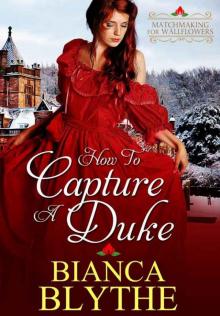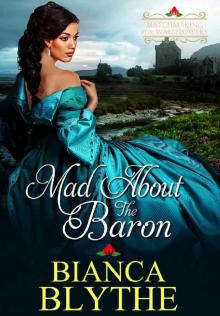- Home
- Bianca Blythe
A Rogue to Avoid (Matchmaking for Wallflowers Book 2)
A Rogue to Avoid (Matchmaking for Wallflowers Book 2) Read online
A Rogue to Avoid
Bianca Blythe
Copyright © 2016 by Bianca Blythe
All rights reserved. This book or any portion thereof
may not be reproduced or used in any manner whatsoever
without the express written permission of the publisher
except for the use of brief quotations in a book review.
Contents
A Rogue to Avoid
Prologue
Chapter One
Chapter Two
Chapter Three
Chapter Four
Chapter Five
Chapter Six
Chapter Seven
Chapter Eight
Chapter Nine
Chapter Ten
Chapter Eleven
Chapter Twelve
Chapter Thirteen
Chapter Fourteen
Chapter Fifteen
Chapter Sixteen
Chapter Seventeen
Chapter Eighteen
Chapter Nineteen
Chapter Twenty
Chapter Twenty-One
Chapter Twenty-Two
Chapter Twenty-Three
Chapter Twenty-Four
Chapter Twenty-Five
Chapter Twenty-Six
Chapter Twenty-Seven
Chapter Twenty-Eight
Chapter Twenty-Nine
Chapter Thirty
Chapter Thirty-One
Chapter Thirty-Two
Chapter Thirty-Three
Epilogue
Connect with Bianca
How to Capture a Duke
A Rogue to Avoid
A Scottish rogue …
Gerard Highgate, Marquess of Rockport , knows better than to wed an Englishwoman, especially one as prickly as Lady Cordelia. But when his mother dies and he finds himself saddled with her debts, he needs a wife and he needs one fast.
An exacting Englishwoman …
Lady Cordelia knows that hastiness in husband hunting leads to mistakes. But when she visits an aristocrat to warn that his life might be in danger, he misinterprets her suggestion to flee to Scotland.
An unexpected elopement …
Most elopements are born of love, not misunderstanding. Cordelia and Gerard have already broken that rule, but perhaps they can still make their marriage one of love.
Prologue
Matchmaking for Wallflowers
Letters to the Editor
October 1816
Dear distributors of drivel:
It has come to my attention that I have been featured yet again under the heading Top Ten Lords to Land. Please let me assure the readers, and whomever this secret editor is, that I do not wish to be on this list.
I am gratified that you believe that my “shoulders have a breadth more commonly seen in sturdy farmhands” and that you are willing to overlook my “inability to tie an elegant cravat.” It is kind of you to suggest that I could “simply pay an extensive visit to Beau Brummel after marrying,” and that “even if I prove to be a lost cause, my symmetrical features might make their way to the second generation.”
I urge the unmarried women of the ton to please remove me from your lists of potential husbands even if you are aware of a “miraculous linguist who can tackle my rough accent” and are capable of “burning all my kilts.”
Despite this magazine’s belief that I might make someone an “if not ideal, at least tolerable match, despite my unsavory origins” I would like to state that I am not interested in making any match at all.
Gerard Highgate, Marquess of Rockport
Scotland
*
Matchmaking for Wallflowers
November 1816
We were delighted to receive personal correspondence from Lord Rockport. His lordship’s sense of humor, even when directed at us, is a delight, and we have moved him to the top of our list of Lords to Land. We encourage all young ladies to travel to Scotland to trap this elusive aristocrat. Arm yourselves with a copy of Waverley, laud the dull-colored Highland peaks that our Scottish neighbors extol with such inexplicable and incessant raptures, and you will find yourself wed by the end of the season.
*
Matchmaking for Wallflowers
Letters to the Editor
December 1816
Dear scribblers of silliness:
While I am cognizant of the supposed honor bestowed on me by crowning me the top Lord to Land I can assure you of my continued resistance to having anything to do with a pamphlet so plenteous in prattle. The peace I cherish in Scotland has been marred by a sudden preponderance of marriage-minded Englishwomen and their calculating mamas.
While some gentlemen have assured me that I have been awarded the ultimate adulation, I am aware of the darker sides of this babble-infested booklet and my newfound position has not made me succumb to the flattery to which so many of my peers surrender.
Recently the new Duke of Alfriston was gleefully maligned in these pages. I wonder at the sanity of my English neighbors who take pleasure in promoting such arbitrary, yet vigorously followed advice. Who wields such ill-deserved influence?
I feel duty-bound to announce to the less-informed souls, who seem to comprise the entire population of Mayfair, that I have become aware that Lady Cordelia Haywood, daughter of the Duke of Belmonte, is a contributor to Matchmaking for Wallflowers.
Let me remind the ton that though her ladyship might be in possession of some faint beauty, she is devoid of a single quality to qualify her for writing articles on the vastly overrated art of decorum and etiquette. This charmless chit was betrothed to three dukes, a number never equaled by any other debutante, a fact that should be cause for shame, not celebration, for her ladyship and her rumor riddled family. It would not surprise me if she had composed the condescending articles on the Duke of Alfriston’s missing leg herself.
I urge you to stay away from foolish pamphlets, stay away from foolish chits, and by God, stay away from Scotland. This Scotsman values his peace.
*
Matchmaking for Wallflowers
Letters to the Editor
January 1817
We pride ourselves on our anonymity. The maintenance of etiquette occurs with the most reliability when it is felt as an all-seeing, all-knowing, and always mysterious presence. Miss Cordelia Haywood has been removed as a contributor, and our readers are once again urged to follow the art of decorum stringently lest they find their misdeeds reported for the benefit of others.
It should also be noted that Lord Rockport was entirely undeserving of this treasured pamphlet’s praise and has been removed from the list of Lords to Land. This rogue is one to avoid.
Chapter One
Yorkshire
April, 1817
Lady Cordelia fluttered her fan though the ballroom hardly qualified as warm.
Or perhaps she’d simply never spent a ball sitting down.
Thick Yorkshire accents rumbled around her and merged with the notes of poorly tuned violins. Guests clomped their slippers over the stone floor, and women swirled in murky blue and brown dresses. Most gowns seemed hastily modified from several seasons’ past, though some seemed as if no one had even attempted to rectify their unfashionable lines. The guests’ faces were flushed, their eyes sparkled with vivacity normally seen on jeweled tiaras as they changed dance partners with an exuberant frequency—and not a single person had asked Cordelia to dance.
Cordelia kept her torso at the ninety-degree angle her governesses had advocated. Unfortunately, the gesture did not compel any of the plethora of gentlemen to ask her to dance despite the adamant assurances of he
r numerous etiquette books that men found rigid postures desirable.
She resisted the urge to tap her foot as the music switched to a popular melody. The joyful notes might be crescendoing, but she couldn’t permit anyone to think her unhappy. She desired no one’s sympathy.
Perhaps the gentlemen simply were unaware of her status. Or perhaps they found her beauty intimidating. Blonde hair, blue eyes, and rosebud lips might overawe some people. Especially when the locks in question were glossy, the eyes large and wide, and the lips exquisitely shaped. More than one ardent suitor had compared her eyes to azure skies seen in the art of Renaissance masterpieces.
But that had been—before.
The guests continued to prance over the floor, and the men continued to ignore her.
It was almost as if—
The thought was impossible, and she took a lengthy sip of her orgeat, despite her lack of affection for the cloyingly sweet taste and the unlikely pairing of almonds and oranges.
She couldn’t be a wallflower.
She simply couldn’t be.
That was a fate for other women, ones with smaller dowries, and educations at less vigorous finishing schools.
Cordelia scanned the ballroom again. But unlike in her favorite Loretta Van Lochen novels, no charming prince weaved his way through the crowded assembly rooms.
Which, come to think of it, was utterly fine. Dancing meant being on display, and despite her mother’s habit of dragging her to the finest dressmakers, Cordelia favored being away from the scrutiny of people she was beholden to impress.
Her mother frowned at her from behind the silver punch bowls and rows of crystal glasses.
Cordelia raised her hand to her locks, prepared to brush away any loose strands, but her hairstyle was immaculate. She smoothed her dress, but the sumptuous fabric was unstained and devoid of wrinkles. Her gown remained impeccable.
People should be dancing with her.
Last season the men had begged her for the honor.
She scoured the groups of assorted men again. Most avoided her eye contact. Enraptured in their own conversations, they were likely discussing cricket and cigars.
One man smiled, and his legs shifted in a manner that implied he might be considering crossing the ballroom floor to see her. It was Orlando Filbee, a man she hadn’t glanced at in her last season, though now she wanted to embrace him for even considering approaching.
Perhaps—perhaps she might even venture to smile.
Just as she contemplated whether the action verged on the overly flirtatious, the man beside him firmed his expression and gestured in her direction.
The other man, one Cordelia had never been introduced to, but who clearly knew all about her, for he kept looking her way as he whispered into Filbee’s ear.
Filbee’s smile vanished, replaced by a now familiar mixture of suspicion and surprise, the sort that always seemed to appear when men heard of her story.
She inhaled, but the sudden influx of air did nothing to calm her heart. It took all her effort to keep her expression tranquil as an increasing number of guests pointed toward her.
Smoke stung her eyes. She’d chosen a corner near the fireplace, yet the warm flames irritated her. She should move, but right now the prospect of marching through the ballroom, making it clear to everyone that no one desired to dance with her, seemed horrendous.
Giggles sounded beside her.
Wallflowers.
Most of them were new debutantes. Perhaps no man desired to dance with them, but they had each other.
She considered joining them, but they leaned toward one another, covering their mouths with their fans.
Gracious. They were chatting about . . . her.
She strove to retain her composure. She was supposed to be a hostess. She was supposed to have joined society’s finest matrons. She was supposed to be preparing for an heir and five spares.
She was absolutely not supposed to be a wallflower.
After all, she was the daughter of a duke. The only daughter of a duke. And not the type of duke desperate for money with only a crumbling estate and some maudlin tales of his family’s tumble from prosperity. Her father’s wealth was renowned. In fact, others even approached him for loans. Her father might be distant, he might not speak to her often, but at least no one doubted his importance.
The new debutantes didn’t relate to her. They’d clearly heard rumors of her snobbery. And it was true. She didn’t enjoy speaking to people at these events. But there was nothing personal about her dislike. She didn’t desire to speak to anyone—not really. She wasn’t snubbing anyone with her shortened answers and her unease at inquiring about someone’s health.
Someone needed to fulfill her parents’ ambitions, and nothing would happen if she abandoned her focus.
The smoke continued to sting her eyes, and she swallowed hard and forced her features to relax. Men did not desire women with sour expressions, and she strove to keep her countenance placid.
After all—what could be more pleasant than spending hours preparing for a ball and then spending the entire time sitting in a corner? At least her immaculate coiffure was bound to remain immaculate. No ridiculous jostling to disturb the carefully pinned curls.
Quite ideal, really. It was a wonder that Matchmaking for Wallflowers hadn’t already published an article on the aesthetic advantages of being a wallflower.
And now she would never be able to submit one.
A woman plopped down beside her and raised a bare hand toward her chest. Her hair was pulled in a stringent bun, devoid of any attempt at elegance and her gown was somewhat damp as if she’d dressed hastily. “Oh, my!”
Cordelia blinked. The woman’s nasal pronunciations, a regrettable talent mastered only by Americans, explained her lack of fashion expertise, even though it did not excuse it.
Cordelia hadn’t approved of those former colonists before the Duke of Alfriston humiliated her, and she certainly did not approve of them after. Perhaps His Grace would never have abandoned her if his mother and two younger sisters did not live in Massachusetts, and he had never visited the land of rough-spoken insurgents with their misguided notions of individuality.
Likely this woman would have taken pleasure in tormenting Britain’s navy, aiming canons on their ships’ sumptuous shapes, and mutilating sailors with the inevitable splinters. Cordelia had read the reports.
The woman brushed aside a loose tendril, plastering it onto her forehead in an unbecoming fashion. “I’m out of breath. The spinning, the jumping, the—”
“There is no necessity to explain the mechanics of dance,” Cordelia retorted.
The woman halted, and she widened her nondescript eyes.
“I mean—I’ve danced before. I know the process.” Cordelia did not have to stoop to the behavior of Americans, no matter how absurd the fact that men asked this woman to dance and not her.
“I haven’t seen you dancing.”
“Ah,” Cordelia attempted a languid sigh, but it seemed to have caught in her throat, likely with her good sense and respectability. She would not let this woman pity her. “I’m new to the region.”
“I am as well!” The woman interrupted her with the customary enthusiastic rudeness Cordelia often noted in Americans.
“I rather gathered by the irregular length of your vowels,” Cordelia said.
“That’s what everyone says. What’s your name?” The woman stretched her lips into a wide grin, an expression typically seen on overfriendly children, and Cordelia found herself smiling back.
“Lady Cordelia Haywood. My father is the Duke of Belmonte. And you are?”
“Oh.” The woman’s smile faltered, and her freckled face—clearly America lacked knowledge of the wonders of lemon juice and buttermilk concoctions—paled. “Truly?”
“I wouldn’t pretend.”
“Who would want to?” The woman’s face reddened. “Oh, dear. Please forgive me. I’m Louisa Carmichael.”
“The Du
ke of Alfriston’s sister?” Cordelia’s voice wobbled.
“Yep,” the woman said miserably. She didn’t add that she’d almost been her sister. She didn’t need to.
“I should speak to my brother now,” Miss Carmichael rose abruptly. “So . . . so good to meet you!”
Miss Carmichael tripped over the hem of her dress and nearly tumbled to the ground before scampering away.
Cordelia wouldn’t have tripped. She never tripped. She was flawless.
She was also a wallflower.
*
Gerard Rockport, Marquess of Highgate, had contemplated death before, but he’d never imagined he’d succumb to that fate while holidaying in the Yorkshire Dales.
That thought seemed less ridiculous now.
Early evening horse rides were meant to be reserved for those members of the ton who withstood the temptations of drink and gaming houses.
And yet Gerard was distinctly being followed by a man who embraced those vices. Huxby Oggleton weaved between trees some distance away. Oggleton had never expressed an interest in the countryside, much less for a landscape only obtained after a grueling multi-day coach ride from the capital.
Suspicious.
Forcing aristocrats to pay gambling debts in murky passageways, aided by a plethora of elaborate knives, seemed more Oggleton’s style. Everyone whispered that Oggleton had murdered Lord Templeton. Everyone whispered that Lord Morgan’s three missing fingers stemmed from an encounter with Oggleton, though the poor man had refused to speak on the incident.
Gerard lacked certainty of many things in the world, and that uncertainty had lately increased, but he was absolutely certain that Huxby Oggleton did not canter on a horse at a time when public houses were open.
Especially not when he was heading in the opposite direction of those great designated venues for gin and ale.
Most suspicious.
No, Oggleton was most certainly not admiring the view, and the long tangerine and lavender strips that reclined across the sky. He was not exercising his horse and noting the appearance of wildflowers sprinkled in the crisp green grass of the amply watered fields, nor was he admiring the pink rays splattered against the surfaces of majestic trees.

 The Earl's Christmas Consultant
The Earl's Christmas Consultant A Holiday Proposal (Wedding Trouble Book 6)
A Holiday Proposal (Wedding Trouble Book 6) The Earl's Christmas Consultant (Wedding Trouble Book 3)
The Earl's Christmas Consultant (Wedding Trouble Book 3) A Kiss for the Marquess (Wedding Trouble Book 5)
A Kiss for the Marquess (Wedding Trouble Book 5) My Favorite Duke (The Duke Hunters Club Book 2)
My Favorite Duke (The Duke Hunters Club Book 2) The Sleuthing Starlet Mysteries
The Sleuthing Starlet Mysteries Lords, Snow and Mistletoe
Lords, Snow and Mistletoe The Body in Bloomsbury
The Body in Bloomsbury How to Capture a Duke (Matchmaking for Wallflowers Book 1)
How to Capture a Duke (Matchmaking for Wallflowers Book 1) Don't Tie the Knot
Don't Tie the Knot Dukes Prefer Bluestockings
Dukes Prefer Bluestockings A Marquess for Convenience (Matchmaking for Wallflowers Book 5)
A Marquess for Convenience (Matchmaking for Wallflowers Book 5) Lords, Snow and Mistletoe: A Regency Christmas Collection
Lords, Snow and Mistletoe: A Regency Christmas Collection Don't Tie the Knot (Wedding Trouble Book 1)
Don't Tie the Knot (Wedding Trouble Book 1) The Perfect Fiancé (Matchmaking for Wallflowers Book 0)
The Perfect Fiancé (Matchmaking for Wallflowers Book 0) A Rogue to Avoid (Matchmaking for Wallflowers Book 2)
A Rogue to Avoid (Matchmaking for Wallflowers Book 2) Mad About The Baron (Matchmaking for Wallflowers Book 4)
Mad About The Baron (Matchmaking for Wallflowers Book 4)